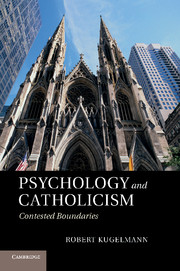Book contents
- Frontmatter
- Contents
- Acknowledgments
- 1 An introduction
- 2 The major fault line: modernism and psychology
- 3 Neoscholastic psychology
- 4 Psychology as the boundary: Catholicism, spiritualism, and science
- 5 Psychoanalysis versus the power of will
- 6 From out of the depths: Carl Jung's challenges and Catholic replies
- 7 Institutionalizing the relationship
- 8 Humanistic psychology and Catholicism: dialogue and confrontation
- 9 Trading zones between psychology and Catholicism
- 10 Crossings
- References
- Index
1 - An introduction
Published online by Cambridge University Press: 05 July 2011
- Frontmatter
- Contents
- Acknowledgments
- 1 An introduction
- 2 The major fault line: modernism and psychology
- 3 Neoscholastic psychology
- 4 Psychology as the boundary: Catholicism, spiritualism, and science
- 5 Psychoanalysis versus the power of will
- 6 From out of the depths: Carl Jung's challenges and Catholic replies
- 7 Institutionalizing the relationship
- 8 Humanistic psychology and Catholicism: dialogue and confrontation
- 9 Trading zones between psychology and Catholicism
- 10 Crossings
- References
- Index
Summary
The science and profession of psychology emerged in the mid- to late nineteenth century. In all its varieties, including “pop psychology,” psychology is one of the ways that we in the contemporary world ask the questions: “Who am I?” “What sort of things are we?” “How shall I live my life?” “What makes me happy, sad, confused, anxious?” These questions arise not only in the abstract, they occur also in activities of healing, correcting, adjusting, guiding, treating, managing, counseling. Even though in many quarters, psychologists have distanced themselves from such questions – call them philosophical – the inescapable truth is that they surface in all psychologies, pure and applied. Psychology asks these questions and psychology answers them. Questing for the nature of human nature, of mental illness, of cognition, of personal growth, for the tasks and challenges of childhood and old age, and in countless other ways, psychology addresses the vexations of living and dying.
And so psychology is an ethical science, ethics being the discipline that seeks to know how we should live our lives. Textbooks and clinicians and researchers, in one way or another, advise us how to conduct our lives. At the very least, they provide information, but all such information implicitly offers guidelines for conduct: description is prescription. This is not an indictment of psychology, for there is great effort to be fair and neutral within the field; it is simply stating the obvious case that no science that describes and explains human behavior and mental life can avoid indicating better and worse ways to act, think, and feel.
- Type
- Chapter
- Information
- Psychology and CatholicismContested Boundaries, pp. 1 - 31Publisher: Cambridge University PressPrint publication year: 2011



